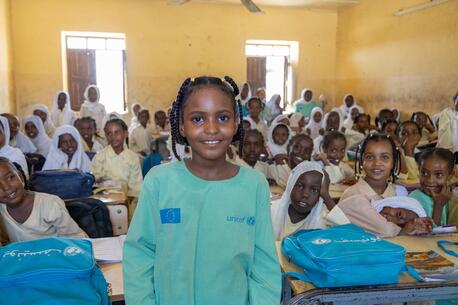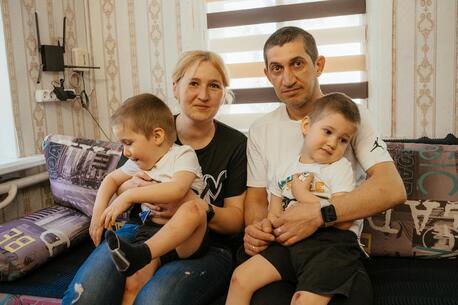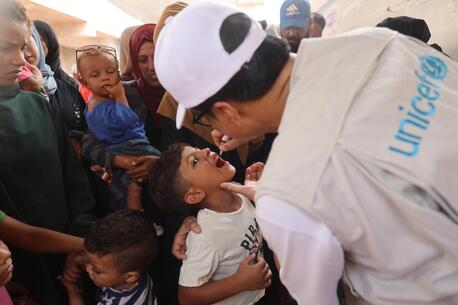
Back to School After Fleeing War: Ukrainian Students in Moldova
Schools in Moldova are welcoming child refugees from Ukraine into their classrooms — helping them to get comfortable and continue learning after traumatic wartime disruptions.
UNICEF has partnered with the Ministry of Education of Moldova to help students integrate into the local school system.
"Our teachers are dedicated to finding solutions for children so that they do not feel inferior or different,” says Marina Saltanovscaia, a high school principal in Chisinau.
Sasha and Vanea, siblings from Ukraine, find safety from war and a sense of belonging in Moldova
Saltanovscaia says that Ukrainian parents started contacting the school on Feb. 24, the day conflict first started escalating. Before long, children from 39 Ukrainian refugee families were enrolled.
Ten-year-old Sasha and her brother, 14-year-old Vanea, are from Zhyytomyr, northwest Ukraine. "At first, they were quite reserved," Saltanovscaia said. "They didn’t know if other children would accept them, but they integrated quickly into our community.”
“It’s nice at this school," Vanea says. “I haven’t been bullied, and I’ve found people I am comfortable around. Sasha has adapted well, too. Everyone loves her, adores her, and she tries really hard in class.”
Helping Ukrainian children get back to learning: an integral part of UNICEF's overall emergency response to the war
UNICEF's efforts to ensure access to education — helping kids get back to learning as part of their daily routine — is an integral part of the overall emergency response to the war, both inside Ukraine and in refugee-hosting countries. Since Feb. 24, over 272,000 children inside Ukraine have benefited from learning interventions with supplies provided by UNICEF and over 400,000 children have been engaged in formal or non-formal education with UNICEF's support.
While working to expand these efforts, and reach more children in need, UNICEF is also consulting with Ukraine government officials at the national, regional and municipal levels as they prepare for the start of a new school year. Priorities include making school buildings safe and suitable for learning again and strengthening psychosocial support services for students. As of July 22, 2,188 educational institutions in Ukraine had been damaged by bombing and shelling, including 221 that had been completely destroyed. Others have been repurposed as shelters for displaced families.
Help UNICEF reach more vulnerable children impacted by the war in Ukraine with the support they need to survive and thrive. Donate today.
HOW TO HELP
There are many ways to make a difference
War, famine, poverty, natural disasters — threats to the world's children keep coming. But UNICEF won't stop working to keep children healthy and safe.
UNICEF works in over 190 countries and territories — more places than any other children's organization. UNICEF has the world's largest humanitarian warehouse and, when disaster strikes, can get supplies almost anywhere within 72 hours. Constantly innovating, always advocating for a better world for children, UNICEF works to ensure that every child can grow up healthy, educated, protected and respected.
Would you like to help give all children the opportunity to reach their full potential? There are many ways to get involved.





